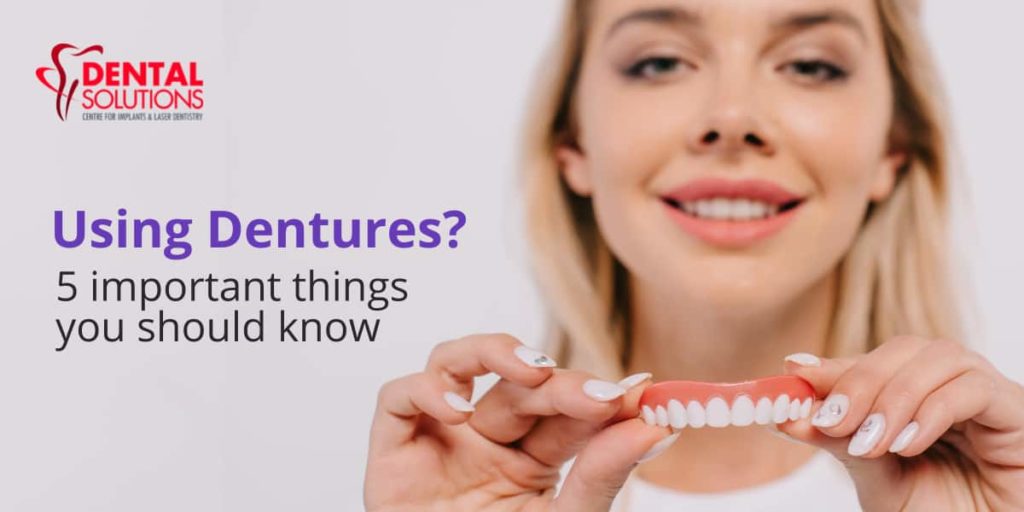Best Dental Clinic In Bangalore Indiranagar | Best Dentist in Bangalore Indiranagar
5 important things every person with dentures must know

Looking for tooth replacement treatment options? For years, dentures have been known as the go-to dental appliances for replacing missing teeth. Although these are not the only solution for tooth/teeth replacement, there are several ways to replace missing teeth and your dentist will be able to recommend the best option for you, whether it’s a denture, dental bridge or a dental implant.
What are Dentures?
Dentures are removable replacements for missing teeth. They are of course artificial, but they look, feel and function exactly like the natural ones. Having lost some or most of your teeth can take a toll on your health and appearance. It can distort your appearance and eating food might become difficult. Dentures help people with missing teeth to chew and bite food normally and smile confidently.
Before going ahead with opting for dentures, one needs to know about the types of dentures that are available.
Mainly, there are two types of dentures:
- Complete dentures
- Partial dentures
Let us look at these 2 types of dentures in detail:
Types of Dentures
Complete dentures are used when all the teeth are missing, while partial dentures are used when some natural teeth are missing and some remain.
1. Complete Dentures
Complete dentures, as stated earlier, replace your full set of teeth. They are usually made from plastic (acrylic) and are further categorised as conventional or immediate.
A conventional denture is ready for placement in the mouth about 8 to 12 weeks after the teeth have been removed. Waiting for a good 8-12 weeks before fitting dentures will give your gums time to heal from the extractions, while also allowing for gum shrinkage that will occur in the boney ridge during this period.
Immediate dentures are made in advance and are placed right after the teeth have been removed. The greatest advantage of having immediate dentures is the fact that you will walk out of the clinic with a complete set of teeth, yes, you will not have to wait without teeth for weeks! However, there is a disadvantage as well. Unlike conventional dentures, where there is a waiting period, and gums undergo a healing process, immediate dentures are placed right after extractions and do not have the waiting period for gum healing. This causes the bones and gums to shrink over time and the dentures require more adjustments to fit well during the healing process.
2. Partial Dentures
Partial dentures are used when only a few teeth remain. The base of the denture is made from either metal or plastic (acrylic), and the teeth are usually acrylic.
There are two options – removable and permanent partial denture. A partial denture usually has replacement teeth attached to a pink or gum-coloured plastic base, which is connected by a metal framework that holds the denture in place in the mouth. Not only is a removable partial denture less expensive, but with this denture, the dentist can replace many teeth with one appliance. Partial dentures provide more of a natural-looking appearance.
Read: All you need to know about the types of dentures
Drilling down to the main topic, here are 5 things every person with dentures must know:
1. Dentures need relining in due course of time
Denture reline is a form of cosmetic dental restorative work – a quick procedure to reshape the underside of a denture so that it bridges the gaps between two or more missing teeth and fits more comfortably on the gums.
Relining is periodically necessary as dentures are prone to losing their grip in the mouth, over time. This procedure can also help in soothing the pain that comes from sore spots. The process is more cost-effective than having brand new dentures.
2. Remove them when not in use
Dentures need to be removed when not in use, especially at night. This will give your gums and bone some time to relax from the pressure of the denture.
If you continue wearing them all day and night, you may suffer from severe bad breath, shrinking gum line or numbness in the gums. Further, it can also cause damage to dentures.
When you take off dentures, make sure to soak them in a glass of denture cleaning solution or water.
3. Practice appropriate oral hygiene
Having a set of artificial teeth in no way means that you do not need to care for your oral health. In fact, you need to be more careful now. This is because, although dentures are made up of artificial material– bacteria, plaque, and tartar can still build upon them and can harm the existing teeth and gums.
Taking oral care lightly while having dentures could lead to severe issues like Angular Cheilitis and Leukoplakia. Make sure you are following these oral practices:
- Dental consultations every 2-3 months
- Cleaning dentures regularly, just like your regular teeth – Once you take them out, run clean water over them to remove any food particles that may be stuck between the teeth. Brush the dentures with a soft toothbrush and a denture cleaner. Do not use any other cleaning agents or regular toothpaste, as these are too abrasive and wear away the denture materials. Also, make sure to clean your gums with a soft washcloth.
4. Do not miss out on your regular dental examinations
Having dentures in no way means your oral health needs no care. You need to visit the dental clinic for an overall check-up. This is more important so that any growing dental issues can be spotted at the early stages.
Additionally, any denture-related issues can be fixed before they reach a complicated stage.
Again, do not miss out on your dental appointments, ever!
5. Practice eating and talking to get adjusted
If you have just started wearing your dentures, you will know that eating and talking gets slightly difficult or rather uncomfortable. Getting used to dentures will take some time, but you need to start practising. You must start with eating soft foods. As you eat, the muscles in your mouth will gradually accommodate the dentures as the replacement teeth.
Same with speech, keep practicing, read out loud. pronunciation of some words may become difficult, but be patient, with practice, it will all be alright.
While dentures are one of the options for teeth replacement, dental implants and dental bridges are also popular and most recommended options. If you are looking for teeth replacement treatments, talk to your dentist about what would be the most ideal option for you.
We are well-known for providing the best dental treatments in Bangalore. To know more about the cost of dentures or Denture price, procedure, and options, contact us.
FAQ’s
1. What are dentures, and how do they help?
Dentures are removable, artificial replacements for missing teeth that look, feel, and function like natural teeth. They help restore chewing, speaking, and smiling abilities while improving appearance and confidence.
2. Should I remove my dentures at night?
Yes, remove dentures at night to allow your gums and bone to rest, prevent bad breath, gum shrinkage, or numbness, and avoid damage to the dentures. Soak them in denture cleaning solution or water when not in use.
3. How should I clean my dentures and maintain oral hygiene?
Clean dentures daily by rinsing off food particles, brushing with a soft toothbrush and denture cleaner (not regular toothpaste), and cleaning your gums with a soft washcloth. Avoid abrasive cleaners to protect denture materials.
4. How can I adjust to eating and speaking with new dentures?
Start with soft foods and practice chewing to help the mouth muscles adapt. For speech, practice reading aloud to improve pronunciation, as it may take time to adjust to the feel of dentures.
